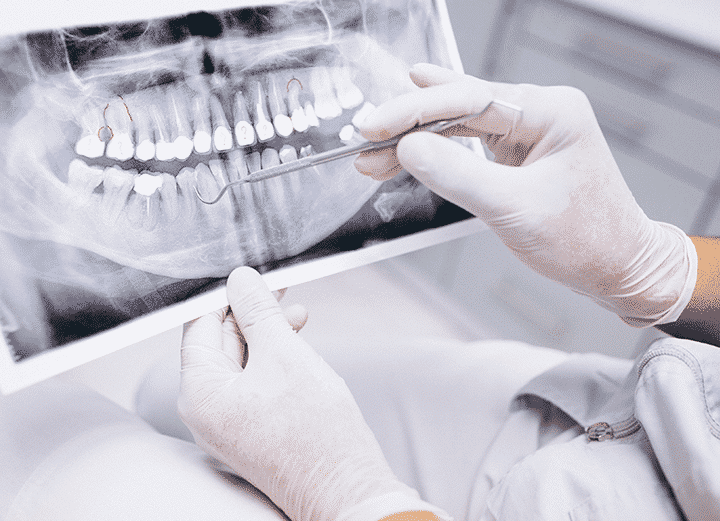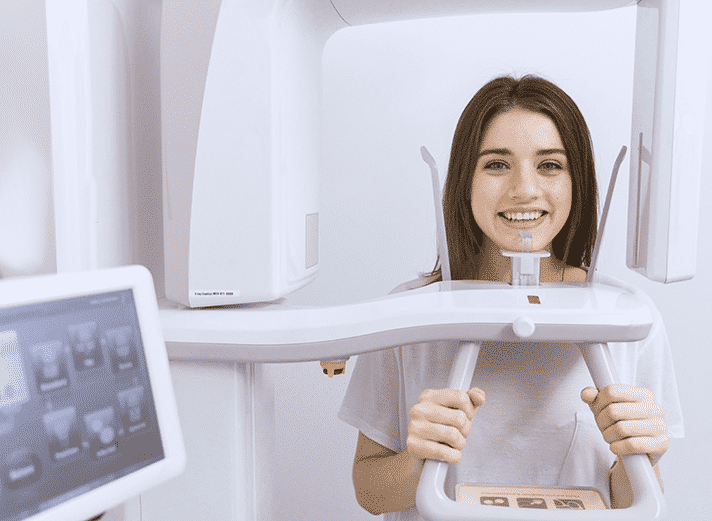Swollen, red and bleeding gums are classic signs of gum disease.
Other causes of gingivitis include medications (causing overgrowth of gum tissue), chronic medical conditions such as diabetes (which may pose a greater risk of infection or poor gum healing), poor nutrition such as vitamin and mineral deficiencies, and viral or fungal infection.
Symptoms depend on the severity of the condition, with bleeding being one of the most common. However, this sign can be masked or even absent in smokers as a result of a compromised blood supply, which compounds the issue further.

Periodontitis

“Destructive gum disease”, or periodontitis, is marked by the destruction of tooth-supporting ligaments and bone. Once this damage has occurred, it cannot be reversed, so your teeth won’t return to their original health.
Signs of periodontitis include bad breath, or halitosis, gum recession resulting in the formation of dark or black triangles between the teeth, and the classic “getting long in the tooth”. Looseness of the teeth can also occur, resulting in the teeth changing position in the mouth. The end stage of the condition is severe loss of supporting structures around the teeth and eventually loss of the teeth themselves.
Periodontitis can often be stabilised and its development arrested, but this requires an ongoing active relationship with your dental practitioner and excellent home care.
As genetics often play a part in periodontitis, sufferers will always be susceptible to further periodontal destruction if they do not maintain high-quality, regular home and professional cleaning. Patients who smoke are at an increased risk of suffering periodontitis, as are those with other chronic conditions such as diabetes or insulin resistance.
The only way to fully understand the cause of your bleeding gums is with a dental examination. Call our reception team to make an appointment today.

Other causes

Less commonly, bleeding gums can be associated with serious medical conditions and inflammation elsewhere in the body.
The only way to understand the cause of your bleeding gums fully is via a dental examination. A simple examination can alert your dental practitioner to the presence of any gum disease, which would then warrant a more detailed assessment of the gum tissues, including radiological analysis of the supporting bone structures and, if needed, referral to a periodontist (gum specialist).
Call our reception team on 13 13 96 to make an appointment.
Frequently Asked Questions
Periodontal disease, commonly known as gum disease, is a condition that involves either inflammation of the gums (known as gingivitis) or a more chronic condition (periodontitis). Advanced cases of periodontitis can cause loss of the bone structures that support the teeth and, subsequently, loss of the teeth themselves. Periodontitis has been shown to be associated with heart disease, stroke, whole body (systemic) infections and low birth weight in premature babies.
Look out for:
- bleeding gums
- swollen gums
- redness of the gums
- painful gums
- loss of gum tone and texture
- gum recession
- bad taste
- halitosis (or bad breath)
- tooth movement and migration
- difficulty chewing.
To prevent gum disease, you should brush your teeth at least twice a day and use dental floss or brushes for cleaning in between your teeth (interdental brushes). If you have gingivitis, the condition is reversible with effective brushing and flossing.
Some patients with gingivitis will progress to periodontitis. Periodontitis does not cause symptoms initially, so it is important to have regular dental check-ups to identify its presence. Your dentist should be able to diagnose gum disease and suggest a referral to a gum specialist. If you arrest gum disease in the early stages, you may be able to prevent the early loss of teeth.
Treatment of periodontitis is better described as ongoing maintenance rather than a cure. Management and maintenance require improved oral hygiene and an active ongoing relationship with your dental practitioner.
If you have periodontal disease you may be referred to a periodontist for assessment and ongoing treatment of the gums. At Smile Solutions you do not need a referral to see one of our specialist periodontists. Just call us on 13 13 96 to discuss your needs and arrange an appointment.
No mouth rinse has been proven to prevent gum disease; however, in some situations a periodontist (gum specialist) may recommend use of a short course of antibacterial mouth rinse in conjunction with in-chair treatment.
These mouth rinses can be purchased from either Smile Solutions or from your local pharmacy but they are only recommended for use under the guidance of your dentist or hygienist as they can have unwanted side effects if not used appropriately. They must always be kept away from children.
You might be surprised to know that your mouth is home to up to 26,000 oral microbial species. While most of these live in harmony, some are harmful to the oral tissues. In certain conditions, an imbalance of oral bacteria can result in a disproportionate amount of destructive bugs, causing periodontitis. When present, this disease can affect your general health in multiple ways.
Cardiovascular disease
Gum disease can affect your heart and blood vessels, as bacteria present in periodontitis initiate a variety of reactions from the body’s immune system. These reactions result in elevated levels of a protein that is associated with generalised inflammation. This protein is also associated with peripheral artery disease in otherwise healthy individuals. Bacteria present in gum disease can also travel through the blood stream and cause a heart condition called endocarditis.
Diabetes
Gum disease and diabetes have a symbiotic relationship. Periodontal disease occurs more commonly in people with diabetes – and, once present, it can cause further progression of diabetes.
The presence of bacteria associated with gum disease can trigger a variety of reactions by the body’s immune system, which causes progression of diabetes. For example, the bacteria can cause further destruction of the cells that produce insulin in the body in type 2 diabetes and of the substance that protects organs from damage. Thus, gum disease can increase the damaging effects of diabetes.
Respiratory disease
The bacteria present in periodontitis has been shown to be linked to infections of the lung, both acute (such as pneumonia) and chronic (such as chronic obstructive pulmonary disorder). Patients who already have a compromised immune system are more susceptible to this progression, so it is important to schedule regular professional examinations and gum treatment.
Complications during pregnancy
In pregnant women, the toxic effects of bacteria present in untreated periodontitis can be transported via the blood stream to the placenta membrane where they can cause rupture of the placenta. Periodontitis has also been linked to low birth weight.
In short
There are many ways in which periodontitis can influence your general health (and vice-versa). The best way to avoid these problems is to manage the disease. A combination of excellent oral care at home and regular maintenance and treatment by your dental team will reduce the risk of other health complications.
